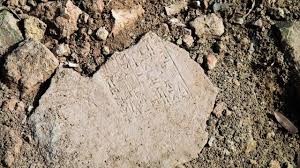The mysterious ancient tablet found in Greece that’s at the centre of an archaeology row

A badly damaged tablet from 5079 BC discovered in Greece may shatter archaeological consensus about the earliest human writings.
Archaeologists believe that the first writing wasn’t developed until 3,000 to 4,000 BC in Sumeria, which is modern-day Iraq.
However, academics have been debating whether the Dispilio Tablet’s markings are forms of written communication or simply art ever since it was dredged up in 1993.
The wooden tablet was found by George Hourmouziadis, the professor of prehistoric archaeology at the Aristotle University of Thessaloniki, and painstaking efforts have been made to preserve it.

It was widely considered to be the case that Neolithic societies were societies without writing, but the Dispilio Tablet throws all that into doubt.
The question is whether researchers will ever be able to establish if the markings are to be considered writing or not.
However, the late Dr Hourmouziadis – who died in 2013 – was cautious about truly understanding the etchings as “text”, and branded them “Neolithic ‘messages’ that we will never be able to decipher.”
Nevertheless, the race is on for specialists to determine what the markings mean and if works out that they are indeed text, it will radically alter the narrative around human communication.
Professor Yorgos Facorellis from the University of West Attica in Athens wrote in the journal Radiocarbon: “The dating of the Dispilio engraved finds is similar to those that appeared in southeastern Europe around 5300 BC, some 2000 [years] earlier than any other known writing.
“These signs and inscriptions are considered by some scholars a specific script of literacy.”





